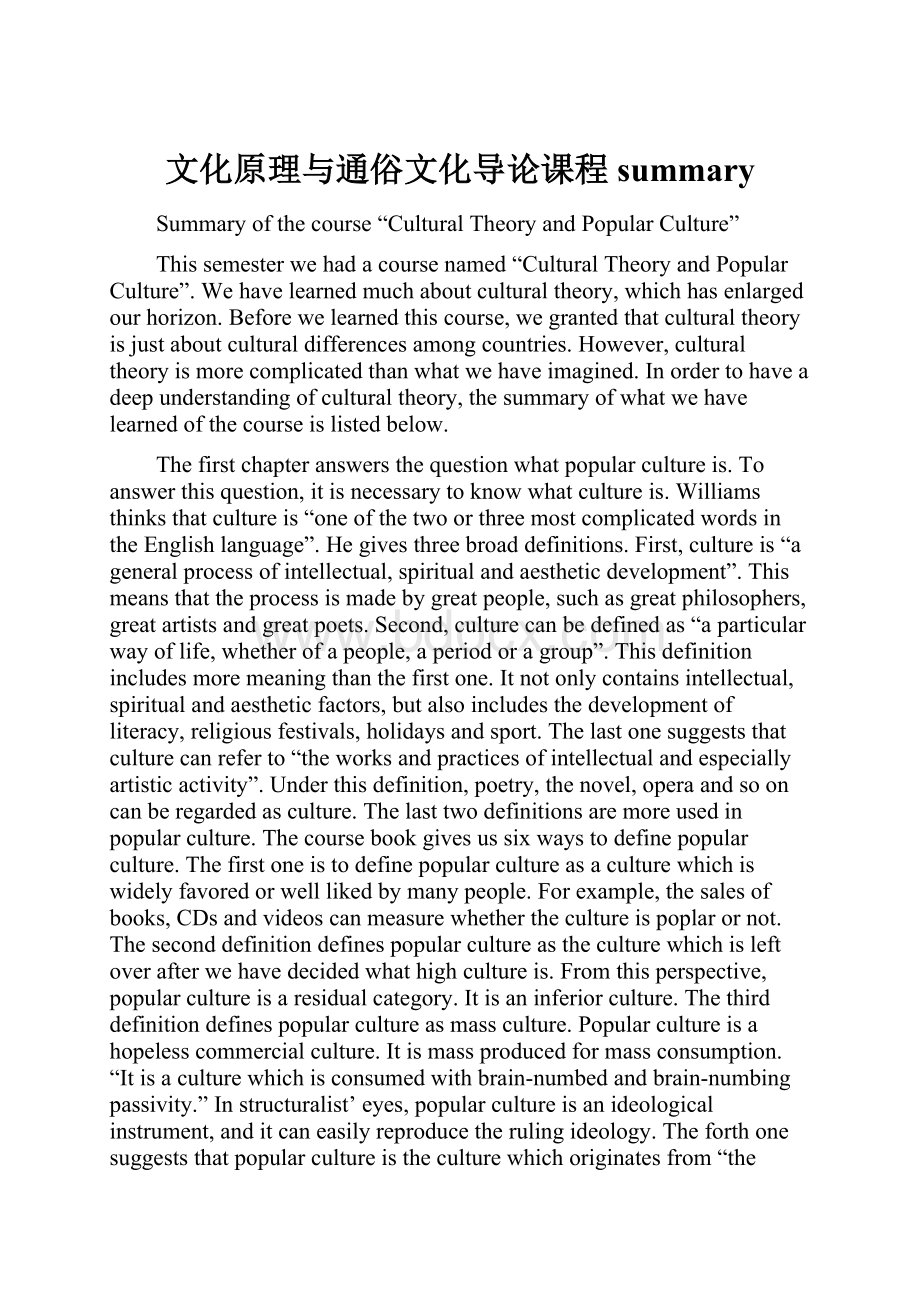文化原理与通俗文化导论课程summary.docx
《文化原理与通俗文化导论课程summary.docx》由会员分享,可在线阅读,更多相关《文化原理与通俗文化导论课程summary.docx(11页珍藏版)》请在冰豆网上搜索。

文化原理与通俗文化导论课程summary
Summaryofthecourse“CulturalTheoryandPopularCulture”
Thissemesterwehadacoursenamed“CulturalTheoryandPopularCulture”.Wehavelearnedmuchaboutculturaltheory,whichhasenlargedourhorizon.Beforewelearnedthiscourse,wegrantedthatculturaltheoryisjustaboutculturaldifferencesamongcountries.However,culturaltheoryismorecomplicatedthanwhatwehaveimagined.Inordertohaveadeepunderstandingofculturaltheory,thesummaryofwhatwehavelearnedofthecourseislistedbelow.
Thefirstchapteranswersthequestionwhatpopularcultureis.Toanswerthisquestion,itisnecessarytoknowwhatcultureis.Williamsthinksthatcultureis“oneofthetwoorthreemostcomplicatedwordsintheEnglishlanguage”.Hegivesthreebroaddefinitions.First,cultureis“ageneralprocessofintellectual,spiritualandaestheticdevelopment”.Thismeansthattheprocessismadebygreatpeople,suchasgreatphilosophers,greatartistsandgreatpoets.Second,culturecanbedefinedas“aparticularwayoflife,whetherofapeople,aperiodoragroup”.Thisdefinitionincludesmoremeaningthanthefirstone.Itnotonlycontainsintellectual,spiritualandaestheticfactors,butalsoincludesthedevelopmentofliteracy,religiousfestivals,holidaysandsport.Thelastonesuggeststhatculturecanreferto“theworksandpracticesofintellectualandespeciallyartisticactivity”.Underthisdefinition,poetry,thenovel,operaandsooncanberegardedasculture.Thelasttwodefinitionsaremoreusedinpopularculture.Thecoursebookgivesussixwaystodefinepopularculture.Thefirstoneistodefinepopularcultureasaculturewhichiswidelyfavoredorwelllikedbymanypeople.Forexample,thesalesofbooks,CDsandvideoscanmeasurewhetherthecultureispoplarornot.Theseconddefinitiondefinespopularcultureastheculturewhichisleftoverafterwehavedecidedwhathighcultureis.Fromthisperspective,popularcultureisaresidualcategory.Itisaninferiorculture.Thethirddefinitiondefinespopularcultureasmassculture.Popularcultureisahopelesscommercialculture.Itismassproducedformassconsumption.“Itisaculturewhichisconsumedwithbrain-numbedandbrain-numbingpassivity.”Instructuralist’eyes,popularcultureisanideologicalinstrument,anditcaneasilyreproducetherulingideology.Theforthonesuggeststhatpopularcultureistheculturewhichoriginatesfrom“thepeople”.Itisfolkcultureandservesthepeople.Thefifthonedeemsthatpopularcultureis“thesiteofstrugglebetweenthe‘resistance’ofsubordinategroupinsocietyandtheforcesof‘incorporation’operatingintheinterestsofdominantgroupsinsociety”.Itis“compromiseequilibrium”.Thatistosay,itisaterrainofideologicalstrugglebetweendominantandsubordinateclasses.Thelastdefinitioncomesaboutaroundthedebateonpostmodernismanditregardspostmodernismasaculturewhichdoesnotdistinguishhighandpopularculture.Asawhole,thesedefinitionshaveonethingincommon.Thatis,theyallregardpopularcultureasonewhichhasrisenalongtheappearanceofindustrializationandurbanization.
Thesecondchapterofthecoursebookis“thecultureandcivilizationtradition”.Thischaptermentionstwogreatfigures:
MatthewArnoldandLeavis.MatthewArnoldmakesgreatcontributiontothewayofseeingpopularculture.HisfamousworkisCultureandAnarchy.Hisfamoussayingaboutcultureis“cultureisthebeatthathasbeenthoughtandsaidintheworld.”ThecoursebookgivesaconclusionofArnold’sthoughtofculture:
cultureistheabilitytoknowwhatisbest;whatisbest;thementalandspiritualapplicationofwhatisbest,andthepursuitofwhatisbest.Arnoldneverdefinedpopularculture,butinhiswork“anarchy”isasynonymforpopularculture.Heusesanarchyorpopularculturetoreferthedisruptivenatureofmiddle-classlivedculture.Popularcultureisarawanduncultivatedmasses.Arnoldwhostandsatthepositionofaristocracyandmiddleclassbelievesthatpopularcultureistheforebodingofgreatpoliticdisorder.Healsopointsthataworkingclasswhichhaslostthestrongfeudalhabitsofsubordinationanddeferenceisverydangerous.Fromhispointofview,educationistheroadtoculture.Arnold’smainconcernisnotculture,andworking-classcultureidissignificantbecauseitsignalsevidenceofsocialandculturaldisorderanddecline,thatis,abreakdowninsocialandculturalauthority.
F.R.LeavisisinfluencedbyArnold’sculturaltheoriesandhealsotakesahostileattitudeonpopularculture.Withthepublicationofthreeworks(MassCivilizationandMinorityculture,byF.R.Leavis,FictionandtheReadingPublic,byQ.D.LeavisandCultureandEnvironment,byF.R.LeavisandDenysThompson),theLeavisites’attitudetowardspopularculturewasformed.LeavisandLeavisitesseethetwentiethcenturyasacenturywithanincreasingculturaldecline.Leavisismassumedthat“culturehasalwaysbeeninminoritykeeping.”However,thestatusofminorityhaschanged.Theminoritydidnotcommandculturaldeferenceanditsculturalauthoritywaschanged.Leavisprefersthetimewhenthemassesexhibitedan“unquestioningassenttoauthority”.Shethinksthat“civilization”and“culture”arebecomingtwoantitheticaltermsandthepowerandsenseofauthorityarenowdivorcedfromculture,andsomeofthemostdisinterestedsolicitudeforcivilizationisapttobeinimicaltoculture.ThethreatofculturalandpoliticaldemocracyisaterrifyingthoughtforLeavisism.Shealsoseesthecollapseoftraditionalauthoritycomingatthesametimeastheriseofmassdemocracy.Tosumup,LeavisismbelievesthatthecultureaftertheIndustrialRevolutioncanbedividedintotwoparts:
oneisthecultureofminoritywhichembodiesthebestthathasbeenthoughtandsaidintheworld;theotherispopularculture--acommercialculturethatisconsumedbymostuneducatedpeople.LeavisismcarriesonArnold’straditionwhichishostiletothepopularcultureandishelpfulformaintainingandproducinganeducatedandcultivatedgroup.
Thethirdchapterisabout“culturalism”.RichardHoggart,RaymondWilliams,E.P.Thompson,andStuartHallandPaddyWhannelinthelate1950sandearly1960sproducedworkabout“culturalism”.Theyinsistthatbyanalyzingthecultureofasociety,itispossibletoreconstitutethepatternedbehaviorandconstellationsofideassharedbypeoplewhoproduceandconsumetheculturaltextsandpracticesofthatsociety.Theyemphasize“humanagency”--theactiveproductionofculturenotitspassiveconsumption.
RichardHoggart’sworktheUsesofLiteracycanbedividedintotwoparts.Oneisthe“older”orderdescribingtheworking-classcultureofHoggart’schildhoodinthe1930s,andtheotheris“yieldingplacetonew”describingatraditionalworking-classcultureunderthreatfromthenewformsofmassentertainmentofthe1950s.Hedescribestheaestheticoftheworkingclassasaninteresttothedailylifedetailsandprofoundinteresttothealreadyknownthings.Theworking-classcultureofthe1930shasastrongsenseofcommunityanditisacultureconsumedandlargemadebythepeople.However,thepleasuresofpopularcultureare“irresponsible”and“vicarious”,superficialandwithnomoralcharisma.What’smore,theyarealsodestroyingtheolder,healthierworking-classculture.The“commercialculture”ofthe1950shadbecomestrongandattackedtheoldculture.However,Hoggartisnottotallydisappointedattheprocessofpopularcultureandhebelievesthattheworking-classhassomepowerofrecovering.Hoggart’sapproachtopopularculturehasmuchincommonwiththeapproachofLeavisism.Theybothrealizedthedeclineofcultureandregardeducationasthemeanstoresistthemanipulativeappealofmassculture.TheydifferinthatHoggarthasdetailedattentiontotheworking-classcultureandtheymakedifferentdefinitionto“goodpast/badpresent”.
RaymondWilliamshasmadegreatinfluenceonculturalstudies.Inhis“Theanalysisofculture”,hegivesthreegeneralcategoriesinthedefinitionofculture.Thefirstiscultureisastateorprocessofhumanperfection;thesecondiscultureisthe“documentary”record;thethirdoneis“social”definition--cultureisadescriptionofaparticularwayoflife.Inthesethreedefinitions,cultureisawayoflifeandexpressesawayoflife.Cultureanalysisisthemeanstorebuildaparticularwayoflife.Thepurposeofculturalanalysisistoreconstruct“thestructureoffeeling”(thesharedvaluesofaparticulargroup,classorsociety).Culturalanalysiscannotreversehistory;itcanshowitsparticularcontemporaryvaluesbyreturningatextorpracticetoitshistoricalmoment.Williams’analysisbreakswithLeavisism.ForWilliams,arthasnospecialplace.Itisahumanactivityalongsideotherhumanactivities.Cultureisaparticularwayoflife.Itisthelivedexperienceofordinarymenandwomen,andisproducedintheirdailyinteractionwiththetextsandpracticeofeverydaylife.Asforcommonculture,Williamsdoesnotwantacommonculture,whileLeavisismwantsonlyahierarchicalcultureofdifferenceanddeference.HallregardsTheLongRevolutionas“aseminaleventinEnglishpost-warintellectuallife”,whichprovidetheradicalrevisionnecessarytolaythebasisforanon-Leavisitestudyofpopularculture.
E.P.ThompsonprovidesadetailedanalysistothepoliticalandculturalformationoftheEnglish-workingclassfromthreedifferentbutrelatedperspectivesinhisbookTheMakingoftheEnglishWorkingClass.Firstly,itreconstructsthepoliticalandculturaltraditionsofEnglishradicalism